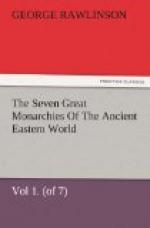Capable of maintaining with ease a dense population, it was likely, in the early times, to be a powerful rival to the Mesopotamian kingdom, over which we shall find that in fact it sometimes exercised supremacy.
On the south Chaldaea had no neighbor. Here a spacious sea, with few shoals, land-locked, and therefore protected from the violent storms of the Indian Ocean, invited to commerce, offering a ready communication with India and Ceylon, as well as with Arabia Felix, Ethiopia, and Egypt. It is perhaps to this circumstance of her geographical position, as much as to any other, that ancient Chaldaea owes her superiority over her neighbors, and her right to be regarded as one of the five great monarchies of the ancient world. Commanding at once the sea, which reaches here deep into the land, and the great rivers by means of which the commodities of the land were most conveniently brought down to the sea, she lay in the highway of trade, and could scarcely fail to profit by her position. There is sufficient reason to believe that Ur, the first capital, was a great maritime emporium; and if so, it can scarcely be doubted that to commerce and trade, at the least in part, the early development of Chaldaean greatness was owing.
CHAPTER II.
CLIMATE AND PRODUCTIONS.
“Ager totius Asiae fertilissimus.”—PLIN. H. N. vi. 26.
Lower Mesopotamia, or Chaldaea, which lies in the same latitude with Central China, the Punjab, Palestine, Marocco, Georgia, Texas, and Central California, has a climate the warmth of which is at least equal to that of any of those regions. Even in the more northern part of the country, the district about Baghdad, the thermometer often rises during the summer to 120 deg. of Fahrenheit in the shade; and the inhabitants are forced to retreat to their serdabs or cellars, where they remain during the day, in an atmosphere which, by the entire exclusion of the sun’s rays, is reduced to about 100 deg. Lower down the valley, at Zobair, Busrah, and Mohammrah, the summer temperature is still higher; and, owing to the moisture of the atmosphere, consequent on the vicinity of the sea, the heat is of that peculiarly oppressive character which prevails on the sea-coast of Hindustan, in Ceylon, in the West Indian Islands, at New Orleans, and in other places whose situation is similar. The vital powers languish under this oppression, which produces in the European a lassitude of body and a prostration of mind that wholly unfit him for active duties. On the Asiatic, however, these influences seem to have little effect. The Cha’b Arabs, who at present inhabit the region, are a tall and warlike race, strong-limbed, and muscular; they appear to enjoy the climate, and are as active, as healthy, and as long-lived as any tribe of their nation. But if man by long residence becomes thoroughly inured to the intense heat of these regions, it is otherwise with the animal creation. Camels sicken, and birds are so distressed by the high temperature that they sit in the date-trees about Baghdad, with their mouths open, panting for fresh air.




